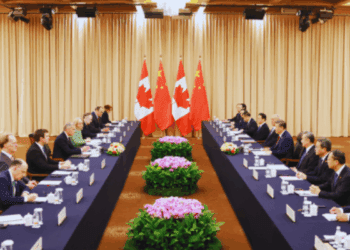July 14, 2012 – In a new column for the Ottawa Citizen and Calgary Herald, MLI’s Brian Lee Crowley writes about how to reshape the Canadian International Development Agency (CIDA) to make it an effective force for Canada. The column was republished in the Montreal Gazette, Vancouver Sun, Regina Leader-Post, Yukon News, and Windsor Star. It is copied below:
CIDA needs to catch up to new thinking
By Brian Lee Crowley, Ottawa Citizen, July 14, 2012
If he likes a challenge, Julian Fantino couldn’t have timed his arrival better as minister for International Cooperation (CIDA). He’ll need his tough guy reputation to be real if he is to reshape CIDA to make it an effective force for Canada, and for good, in a world that desperately needs Canada’s best efforts.
Well briefed as he will be, Mr Fantino will know that CIDA’s traditional development approach has not been a success. Nor has it been a failure, exactly. Rather, a lot of money and effort have been spent for extremely modest results. While CIDA does well in disaster response, for example, it has not managed any significant, long-term or large scale success in helping people out of poverty.
Simply spending more money for more modest results does justice neither to Canadian tax payers nor to the poor whom CIDA is supposed to help; especially when better options exist. But what are those options?
Well, over 500 million Chinese have been moved from poverty into jobs though private sector investment without any assistance from NGOs, CIDA or other traditional development actors. Globally, government-private sector partnerships are creating game-changing innovations such as Advance Market Commitments where aid donors guarantee markets for drugs for the poor that pharmaceutical companies can then produce without the risk of going broke. Remittances (money sent back home by developing world expatriates working in other countries) often eclipse Canada’s development spending by a wide margin and are more effective at spurring durable growth.
The number of people who benefit from these interventions measured against the money spent is truly staggering, far outstripping anything traditional development strategies have done.
Development agencies in the US, Britain, Australia and Europe along with the World Bank and UN have moved aggressively to change their culture to embrace funding for innovation and allying with actors such as private companies and diasporas that have long been the largest sources of cash and effective new ideas for real sustainable development.
Canada has almost completely missed the boat on such innovations and it shows. But there are options for the new minister to help Canada catch up.
Renowned development economist Paul Romer is seeking Canadian assistance, not money, to help create an economic reform zone in Honduras. This idea, embraced by the Hondurans themselves, is to harness private capital to effectively build a brand new city in the country, operating on western institutional lines, with the rule of law, independent courts, enforcement of contract, non-corrupt police and officials, all guaranteed by treaty and a foreign oversight group. Canada could be an important guarantor of the integrity of these institutions, unlocking private sector investment in housing, infrastructure and manufacturing. Romer’s idea is that the world needs more Canada; not more of its cash, but rather more of the institutions we have developed and that help confer such success on our own citizens. If this idea succeeds in Honduras it could form a model for such economic zones all over the world and be magnets for growth in the developing world.
A second opportunity is to join Canadian banks in delivering cell phone banking to the poor. In Haiti, for example, only ten per cent of the population have access to a bank account but over eighty per cent have access to a cell phone. Turning cell phones into bank accounts, creating a secure, quick and low-cost way to handle money, would have a huge, game changing, impact for the poor. This is happening through alliances between cell phone companies and banks, including Canada’s Scotiabank, and the U.S. Agency for International Development, which not only has a whole department dedicated to innovation and working with private companies, but houses a mobile banking division.
When Scotiabank comes to talk mobile banking to CIDA, however, not only is there no mobile banking specialist, but hardly anyone even has experience of working with the private sector. The last minister made some large strides in this direction, but the work remains unfinished. Most other western aid agencies now have plenty of such experts and work with the private sector as a matter of course. The same problem faces Paul Romer or anyone with an idea outside the traditional development model. CIDA has taken timid first steps, working with natural resource companies and NGOs to promote responsible development, but such exceptional partnerships must be made the rule, and quickly.
India, China and the Asian Tigers have proven that development isn’t chiefly about money, and CIDA already has a budget big enough to make a real difference. But only if we learn to spend that money to bring the best of Canada— our innovativeness, our creativity, and our institutions—to those who can put them to work. The new minister has his work cut out for him.
Brian Lee Crowley (@brianleecrowley) is the Managing Director of the Macdonald-Laurier Institute, an independent non-partisan public policy think tank in Ottawa: www.macdonaldlaurier.ca.




